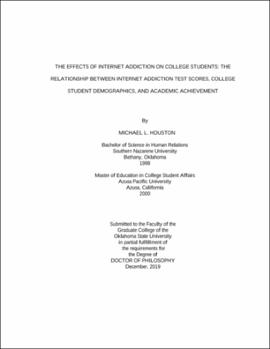| dc.contributor.advisor | Kearney, Kerri | |
| dc.contributor.author | Houston, Michael L. | |
| dc.date.accessioned | 2020-06-26T21:27:56Z | |
| dc.date.available | 2020-06-26T21:27:56Z | |
| dc.date.issued | 2019-12 | |
| dc.identifier.uri | https://hdl.handle.net/11244/324881 | |
| dc.description.abstract | Modern technology has changed education in many ways in a very short time. Not only are college students using technology daily, technology innovations help educators reach broader audiences of students through online learning, and online portals help educators share course materials. Awareness of this modern technology and the impacts it is having on higher education and students has become a critical issue over the past two decades. Even though the benefits of technology are often visible, researchers are finding that technology is creating challenges for some students. Students' access to personal technologies has drastically increased, and with it the level of distraction, which competes with academic interests. | |
| dc.description.abstract | The purpose of this quantitative study was to analyze the relationship between the Internet Addiction Test (IAT) score and academic performance. The IAT measured the student's addiction to the Internet-based upon his or her use. A student's academic performance was measured by grade point average. A sample of 692 traditionally aged college students from both public and private institutions was used to examine if IAT scores were related to and predictive of grade point average. Data analysis comprised four stages: descriptive, correlation, linear regression, and analysis of variance. | |
| dc.description.abstract | This study found a negative relationship was present between students' IAT scores and grade point averages. While the statistics showed that as IAT scores increased, students' grade point averages decreased, the overall affect was minimal. Better understanding of how Internet addiction is related to grade point average may prove helpful for higher education leaders. As technology innovations continue to rapidly increase, it is imperative that educators understand the relationship technologies have on college students. | |
| dc.format | application/pdf | |
| dc.language | en_US | |
| dc.rights | Copyright is held by the author who has granted the Oklahoma State University Library the non-exclusive right to share this material in its institutional repository. Contact Digital Library Services at lib-dls@okstate.edu or 405-744-9161 for the permission policy on the use, reproduction or distribution of this material. | |
| dc.title | Effects of Internet addiction on college students: The relationship between Internet Addiction Test scores, college student demographics, and academic achievement | |
| dc.contributor.committeeMember | Wanger, Stephen | |
| dc.contributor.committeeMember | Vogler Cragun, Jane | |
| dc.contributor.committeeMember | Mwavita, Mwarumba | |
| osu.filename | Houston_okstate_0664D_16588.pdf | |
| osu.accesstype | Open Access | |
| dc.type.genre | Dissertation | |
| dc.type.material | Text | |
| dc.subject.keywords | academic achievement | |
| dc.subject.keywords | internet addiction | |
| dc.subject.keywords | internet addiction test | |
| dc.subject.keywords | problematic technology use | |
| dc.subject.keywords | student success | |
| dc.subject.keywords | technology addiction | |
| thesis.degree.discipline | Educational Leadership and Policy Studies | |
| thesis.degree.grantor | Oklahoma State University | |
